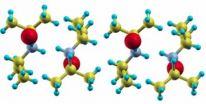(Press-News.org) Research conducted by Matthew Shaffer, a doctoral psychology student at UT and C. Veronica Smith, an assistant psychology professor at the University of Mississippi, reveals that the first sexual experience can set the tone for the rest of one's sexual life.
The study is published in the Journal of Sex and Marital Therapy and is the first to look at whether the circumstances of losing one's virginity have lasting consequences.
"The loss of virginity is often viewed as an important milestone in human development, signifying a transition to adulthood," said Shaffer. "However, it has not been studied in this capacity. We wanted to see the influence it may have related to emotional and physical development."
The researchers examined how first-time sexual satisfaction impacts long-term sexual function as well as how first-time physical and emotional responses affect long-term sexual experiences. They found that positive first-time experiences were predictive of physical and emotional satisfaction. Specifically, those who felt loved and respected by their partner found later encounters more emotionally satisfying.
The researchers asked 331 young men and women about how they lost their virginity. The anonymous participants ranked the experience according to emotions related to anxiety, contentment and regret. They also answered questions about their sex life using scales measuring sense of control, satisfaction and well-being. Finally, the participants filled out a diary for two weeks describing each sexual experience.
A series of analyses revealed those who were most emotionally and physically satisfied the first time found their sex lives the most fulfilling. Those who reported higher levels of anxiety and negativity with the first time reported lower overall sexual functioning.
"While this study doesn't prove that a better first time makes for a better sex life in general, a person's experience of losing their virginity may set the pattern for years to come," said Shaffer.
Shaffer suggests that a first-time sexual experience may create a general pattern of thought and behavior that guides sexual experiences and understanding of information concerning sexuality.
### END
University of Tennessee researcher finds 'first time' could predict sexual satisfaction
Turns out your first time really matters
2013-01-28
ELSE PRESS RELEASES FROM THIS DATE:
Majority of Americans support dozens of policies to strengthen US gun laws
2013-01-28
The majority of Americans support a broad array of policies to reduce gun violence, according to a new national public opinion survey conducted by researchers at the Johns Hopkins Bloomberg School of Public Health. These policies include: requiring universal background checks for all gun sales (supported by 89 percent); banning the sale of military-style semiautomatic assault weapons (69 percent); banning the sale of large-capacity ammunition magazines (68 percent); and prohibiting high-risk individuals from having guns, including those convicted of a serious crime as a ...
Phone and mailed interventions significantly increase colorectal cancer screening rates
2013-01-28
PHILADELPHIA—A mailing or phone call to help patients get screened for colorectal cancer significantly increases their chances of actually getting tested, according to a study published in the January issue of Cancer Epidemiology, Biomarkers and Prevention by researchers at the Kimmel Cancer Center at Jefferson.
The research team, led by Ronald E. Myers, Ph.D., Professor and Director of Division of Population Science, Department of Medical Oncology at Thomas Jefferson University, performed a randomized, controlled trial of 945 people aged 50-79 to test the impact of a ...
Stanford researchers break million-core supercomputer barrier
2013-01-28
Stanford Engineering's Center for Turbulence Research (CTR) has set a new record in computational science by successfully using a supercomputer with more than one million computing cores to solve a complex fluid dynamics problem—the prediction of noise generated by a supersonic jet engine.
Joseph Nichols, a research associate in the center, worked on the newly installed Sequoia IBM Bluegene/Q system at Lawrence Livermore National Laboratories (LLNL) funded by the Advanced Simulation and Computing (ASC) Program of the National Nuclear Security Administration (NNSA). Sequoia ...
Smart organizations should also be stupid according to new theory
2013-01-28
"We see functional stupidity as the absence of critical reflection. It is a state of unity and consensus that makes employees in an organisation avoid questioning decisions, structures and visions", says Mats Alvesson. "Paradoxically, this sometimes helps to raise productivity in an organisation."
Together with colleague André Spicer, Mats Alvesson has written an article entitled 'A Stupidity-Based Theory of Organisations', which was recently published in the renowned Journal of Management Studies and has been featured in the Financial Times. In the article, he expounds ...
Progressive optics for side mirrors ends automobile blind spots without distorting view
2013-01-28
WASHINGTON, Jan. 28, 2013—A new optical prescription for automobile side-view mirrors may eliminate the dreaded "blind spot" in traffic without distorting the perceived distance of cars approaching from behind. As described in a paper published today in the Optical Society's (OSA) journal Optics Letters, objects viewed in a mirror using the new design appear larger than in traditional side-view mirrors, so it's easier to judge their following distance and speed.
Today's motor vehicles in the United States use two different types of mirrors for the driver and passenger ...
Pandemic controversies: The global response to pandemic influenza must change
2013-01-28
'Evil' scientists, deadly viruses and terrorist plots are usually the preserve of Hollywood blockbusters. But when it comes to pandemic influenza, it is the stuff of real life. As controversy about research into the H5N1 bird flu virus continues, a new paper argues for a complete overhaul of current approaches to pandemic preparedness.
To Pandemic or Not? Reconfiguring Global Responses to Influenza, by Dr Paul Forster, of the ESRC STEPS Centre, investigates the H1N1 swine flu pandemic of 2009-10 and sets out some vital lessons if we are to prepare for pandemic influenza ...
Fewer people adding salt at the table
2013-01-28
The number of people in England adding salt to food at the table fell by more than a quarter in the five years following a national campaign, according to research published in the British Journal of Nutrition.
In 2003, the UK Food Standards Agency and the Department of Health launched a national salt reduction campaign to raise public awareness of the impact of salt on health and to work with the food industry to reduce the amount of salt in processed foods.
Although previous research found that the national campaign led to an overall reduction in salt intake, this ...
Novel materials: Smart and magnetic
2013-01-28
Novel, smart materials like shape memory alloys very often display so-called glass-like magnetism. Other smart materials with similar properties include those which, when exposed to a magnetic field, change their electrical resistance, known as manganites, or change their temperature, known as magnetocaloric materials. Kaustav Mukherjee and his colleagues from the Consortium for Scientific Research Indore in India studied a key stage in the formation of such a magnetic glass material, called Pr0.5 Ca0.5 Mn0.975 Al0.025 O3, in a paper about to be published in EPJ B.
They ...
A new material for environmentally friendlier electronics
2013-01-28
The electronics industry has a remarkable impact on the environment, yet research is devising new solutions to reduce it. Among these, a new compound with an unutterable name, the diisopropylammonium bromide (DIPAB), a new ferroelectric material created by an international team of researchers that include Massimo Capone and Gianluca Giovannetti of Istituto Officina dei Materiali at CNR and of the International School for Advanced Studies of Trieste (SISSA), whose research has been just published in Science magazine.
"A ferroelectric material has properties analogous ...
A safer way to vaccinate
2013-01-28
CAMBRIDGE, MA -- Vaccines usually consist of inactivated viruses that prompt the immune system to remember the invader and launch a strong defense if it later encounters the real thing. However, this approach can be too risky with certain viruses, including HIV.
In recent years, many scientists have been exploring DNA as a potential alternative vaccine. About 20 years ago, DNA coding for viral proteins was found to induce strong immune responses in rodents, but so far, tests in humans have failed to duplicate that success.
In a paper appearing in the Jan. 27 online ...
LAST 30 PRESS RELEASES:
Scientists show how to predict world’s deadly scorpion hotspots
ASU researchers to lead AAAS panel on water insecurity in the United States
ASU professor Anne Stone to present at AAAS Conference in Phoenix on ancient origins of modern disease
Proposals for exploring viruses and skin as the next experimental quantum frontiers share US$30,000 science award
ASU researchers showcase scalable tech solutions for older adults living alone with cognitive decline at AAAS 2026
Scientists identify smooth regional trends in fruit fly survival strategies
Antipathy toward snakes? Your parents likely talked you into that at an early age
Sylvester Cancer Tip Sheet for Feb. 2026
Online exposure to medical misinformation concentrated among older adults
Telehealth improves access to genetic services for adult survivors of childhood cancers
Outdated mortality benchmarks risk missing early signs of famine and delay recognizing mass starvation
Newly discovered bacterium converts carbon dioxide into chemicals using electricity
Flipping and reversing mini-proteins could improve disease treatment
Scientists reveal major hidden source of atmospheric nitrogen pollution in fragile lake basin
Biochar emerges as a powerful tool for soil carbon neutrality and climate mitigation
Tiny cell messengers show big promise for safer protein and gene delivery
AMS releases statement regarding the decision to rescind EPA’s 2009 Endangerment Finding
Parents’ alcohol and drug use influences their children’s consumption, research shows
Modular assembly of chiral nitrogen-bridged rings achieved by palladium-catalyzed diastereoselective and enantioselective cascade cyclization reactions
Promoting civic engagement
AMS Science Preview: Hurricane slowdown, school snow days
Deforestation in the Amazon raises the surface temperature by 3 °C during the dry season
Model more accurately maps the impact of frost on corn crops
How did humans develop sharp vision? Lab-grown retinas show likely answer
Sour grapes? Taste, experience of sour foods depends on individual consumer
At AAAS, professor Krystal Tsosie argues the future of science must be Indigenous-led
From the lab to the living room: Decoding Parkinson’s patients movements in the real world
Research advances in porous materials, as highlighted in the 2025 Nobel Prize in Chemistry
Sally C. Morton, executive vice president of ASU Knowledge Enterprise, presents a bold and practical framework for moving research from discovery to real-world impact
Biochemical parameters in patients with diabetic nephropathy versus individuals with diabetes alone, non-diabetic nephropathy, and healthy controls
[Press-News.org] University of Tennessee researcher finds 'first time' could predict sexual satisfactionTurns out your first time really matters



